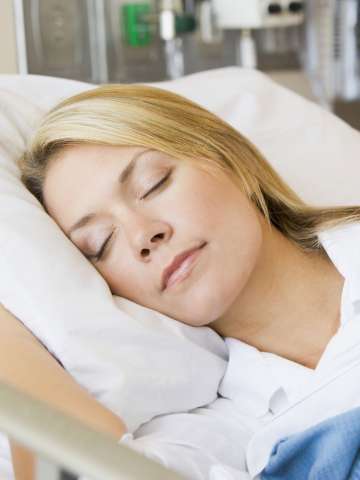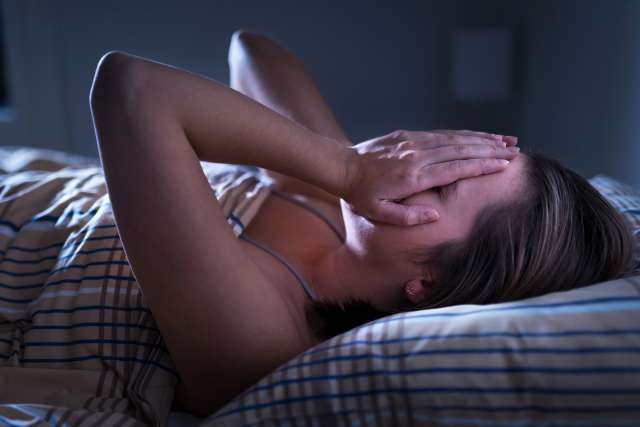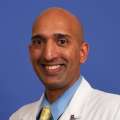Sleep Disorders
Our sleep medicine specialists comprehensively treat sleep disorders in adults and children. We are a nationally recognized program that’s been well-established for more than 50 years.

Why choose UCLA Health for sleep disorders treatment?
As leaders in managing and treating all types of sleep disorders, we offer the full range of care for children and adults. Highlights of our program include:
Experience and expertise: We’ve been diagnosing and managing sleep disturbances for decades. As a recognized leader in sleep medicine and sleep research, the UCLA Sleep Disorders Center features the largest group of clinical sleep researchers in the United States.
Comprehensive, team-based care: Our sleep medicine team includes experts in neurology, pulmonology, psychiatry, pediatric sleep disorders, otolaryngology, dentistry, bariatrics and nutrition. Physicians who are board certified in sleep medicine and registered polysomnographic technologists evaluate and diagnose a range of sleep disorders.
Modern sleep lab: Our state-of the-art sleep lab includes advanced equipment in 11 single-patient accommodations. These tranquil spaces make overnight sleep studies inviting by mimicking the comforts of a hotel room. The lab also provides kid-friendly accommodations and a shared lounge, featuring an elegant space for patients and families.
National accreditation: We have achieved continuous accreditation by the American Academy of Sleep Medicine.
Our areas of care
Our specialists provide multiple services to treat sleep disorders and improve your quality of life. Services include:
Sleep Disorders Clinic
This clinic offers outpatient consultations to new and returning patients. Our specialists discuss your medical history and current challenges and conduct a physical exam.
Your specialist recommends treatment options, including a sleep study, if needed. After a sleep study, you return to the clinic to discuss the results with a sleep specialist. To make an appointment with the Sleep Disorders Clinic, you must have a physician referral to neurology.
Pulmonary Santa Monica Sleep Clinic
In this clinic, pulmonologists offer specialized treatment and support for patients who have respiratory problems affecting sleep. You may be a candidate for this clinic if you have:
- Home ventilatory therapy
- Obesity hypoventilation syndrome
- Obstructive or central sleep apnea
Pediatric sleep clinics
The UCLA Health pediatric pulmonology team evaluates and manages pediatric respiratory disorders. Children may receive treatment through the sleep clinics for:
- Asthma
- Chronic coughing or wheezing
- Chronic lung disease
- Cystic fibrosis
- Interstitial lung disease
- Sleep apnea
- Valley fever
Sleep Disorders Laboratory
Specialists in the laboratory conduct overnight sleep studies to diagnose and manage a spectrum of sleep disorders. Our facility contains 11 private bedrooms and includes pediatric-friendly accommodations. We are accredited by the American Academy of Sleep Medicine and perform sleep studies seven days a week. You must have a physician referral to schedule a sleep study with the laboratory.
Sleep disorders we treat
Our specialists diagnose and treat a range of sleep-related conditions, including:
Excessive daytime sleepiness (hypersomnia): A condition in which a person constantly falls asleep during the day, often while talking or eating
Insomnia: Persistent difficulty falling or staying asleep
Jet lag syndrome: A sleep disorder affecting people who often travel across multiple time zones
Narcolepsy: A sleep disorder that causes excessive drowsiness and sporadic sleeping
Obstructive sleep apnea: Partial or complete airway blockages during sleep
Parasomnia: Unwanted or unusual physical experiences during sleep, such as sleep talking, sleepwalking, sleep paralysis or night terrors
Restless legs syndrome: A neurological disorder that causes an irresistible urge to move the legs, often in the evening
Shift work sleep disorder: A sleep disorder affecting those who work nontraditional hours, such as overnight shift workers
Snoring: Noisy breathing during sleep, often caused by partially blocked airflow
Sleep studies we offer
We offer overnight sleep studies through the Sleep Disorders Laboratory, including:
Nocturnal polysomnogram (NPSG): This is the standard overnight sleep study to assess sleep disorders. We measure all physiological functions during sleep, including breathing, brain wave activity, heart rate, muscle movement, oxygen saturation and snoring.
Expanded electroencephalogram (EEG) sleep recording: We perform an NPSG along with an EEG, a test that measures brain activity. We may use this test if we suspect a patient has seizures at nighttime.
Multiple sleep latency test (MSLT): This daytime test measures how sleepy a patient is after a full night of sleep. We use it after an overnight NPSG. We may use this test to diagnose narcolepsy or other forms of excessive daytime sleepiness.
NPSG with end tidal CO2: This is a modified NPSG where we also measure the level of CO2 (carbon dioxide) at the end of each exhale. This test helps us detect conditions such as obesity hypoventilation. We also often use this test to diagnose sleep disorders in children.
REM (rapid eye movement) sleep behavior disorder: During this modified NPSG, we attach small, metal discs (electrodes) to the patient’s arms and legs. These electrodes measure muscle activity during REM sleep to diagnose conditions that cause people to act out their dreams.
Continuous positive airway pressure (CPAP) or bi-level positive airway pressure (BiPAP) titration: CPAP and BiPAP are common treatments for sleep apnea. With this study, we evaluate what pressure levels most effectively treat apnea in individual patients.
Split night study: This two-part study involves a two- to four-hour diagnostic test with a therapeutic test. If the diagnostic test indicates a possibility of sleep apnea, we may have patients use a CPAP machine the same night. We measure the patient’s response to the CPAP machine to determine if it would be effective treatment.
Maintenance of wakefulness test (MWT): We measure whether a patient can stay awake in a sleep-induced environment. We often use this test to evaluate how well a treatment is working.
Treatments for sleep disorders
Sleep disorders and causes vary significantly. Your treatment plan depends on your symptoms, medical history and condition causing the sleep disturbance.
At UCLA Health, we approach every treatment plan from multiple angles. You benefit from a multispecialty team of experts who focus on your sleep as well as your overall health. You may receive:
- Devices to help you breathe at night, such as an oral appliance that opens airways or a CPAP machine that delivers a steady flow of air
- Medications to help you sleep, control anxiety or treat health conditions that may disrupt your sleep
- Therapy, such as cognitive behavioral therapy (CBT) to help relax your mind and body so you can rest
Our expert team
Our sleep medicine team includes a range of subspecialists who diagnose, evaluate and treat all types of sleep disorders. We are recognized leaders in sleep medicine with continuous national accreditation and more than half a century of experience.
Director
Contact us
Sleep clinic referral and consultation
Physician referred required: Patients must be referred by a primary care physician or subspecialist within the community.
Call 310-825-2631, Monday – Friday, 7 am to 7 pm or send a fax to 310-794-7491 to request an appointment with a sleep medicine specialist at UCLA Health.
Find your care
Our sleep medicine physicians are recognized experts in sleep disorders treatment. To find the right doctor for you, connect with a customer care specialist at 310-825-2631,
Monday – Friday, 7 am to 7 pm

